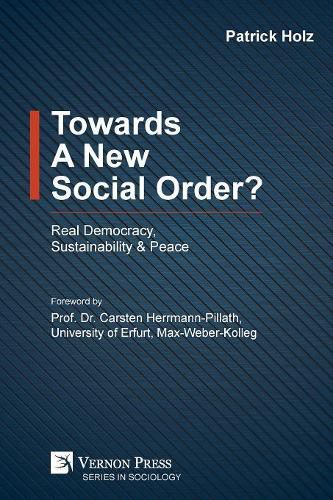Readings Newsletter
Become a Readings Member to make your shopping experience even easier.
Sign in or sign up for free!
You’re not far away from qualifying for FREE standard shipping within Australia
You’ve qualified for FREE standard shipping within Australia
The cart is loading…






This title is printed to order. This book may have been self-published. If so, we cannot guarantee the quality of the content. In the main most books will have gone through the editing process however some may not. We therefore suggest that you be aware of this before ordering this book. If in doubt check either the author or publisher’s details as we are unable to accept any returns unless they are faulty. Please contact us if you have any questions.
This contribution argues that a long-established social order has been in place since the first stratified societies in the Near Middle East which unavoidably comes with substantial economic, political and environmental repercussions. Part I of the book dissects the various facets of this order, which is termed the social dominance paradigm, while in Part II a fundamentally different order, the peace paradigm, is introduced. The latter rests on real democracy (in the Athenian sense), sustainability and peace. As such, both paradigms function as vehicles for further analysis and research while the peace paradigm also provides a rough plan for the implementation of transformational change.
Typically, political, economic, social, and environmental research seeks to increase specialized knowledge. Here, however, the overall intent is to utilize interdisciplinary evidence and connect the dots between a number defining features within seemingly modern societies. The argument is that these are, in fact, not modern at all but follow an ancient template of power, control, and coordination concentrated in the hands of the few.
Potentially, this contribution can function as a trans-disciplinary methodological framework as well as an information hub for researchers in the fields of political and social sciences, history, anthropology, evolutionary biology, organization and peace studies. Practitioners who are interested in fundamental social change may also find the issues raised to be of interest. As such, this book provides a generalist, evidence-based discussion of a multi-disciplinary nature that may pique the interest of both experts and amateurs alike.
$9.00 standard shipping within Australia
FREE standard shipping within Australia for orders over $100.00
Express & International shipping calculated at checkout
This title is printed to order. This book may have been self-published. If so, we cannot guarantee the quality of the content. In the main most books will have gone through the editing process however some may not. We therefore suggest that you be aware of this before ordering this book. If in doubt check either the author or publisher’s details as we are unable to accept any returns unless they are faulty. Please contact us if you have any questions.
This contribution argues that a long-established social order has been in place since the first stratified societies in the Near Middle East which unavoidably comes with substantial economic, political and environmental repercussions. Part I of the book dissects the various facets of this order, which is termed the social dominance paradigm, while in Part II a fundamentally different order, the peace paradigm, is introduced. The latter rests on real democracy (in the Athenian sense), sustainability and peace. As such, both paradigms function as vehicles for further analysis and research while the peace paradigm also provides a rough plan for the implementation of transformational change.
Typically, political, economic, social, and environmental research seeks to increase specialized knowledge. Here, however, the overall intent is to utilize interdisciplinary evidence and connect the dots between a number defining features within seemingly modern societies. The argument is that these are, in fact, not modern at all but follow an ancient template of power, control, and coordination concentrated in the hands of the few.
Potentially, this contribution can function as a trans-disciplinary methodological framework as well as an information hub for researchers in the fields of political and social sciences, history, anthropology, evolutionary biology, organization and peace studies. Practitioners who are interested in fundamental social change may also find the issues raised to be of interest. As such, this book provides a generalist, evidence-based discussion of a multi-disciplinary nature that may pique the interest of both experts and amateurs alike.